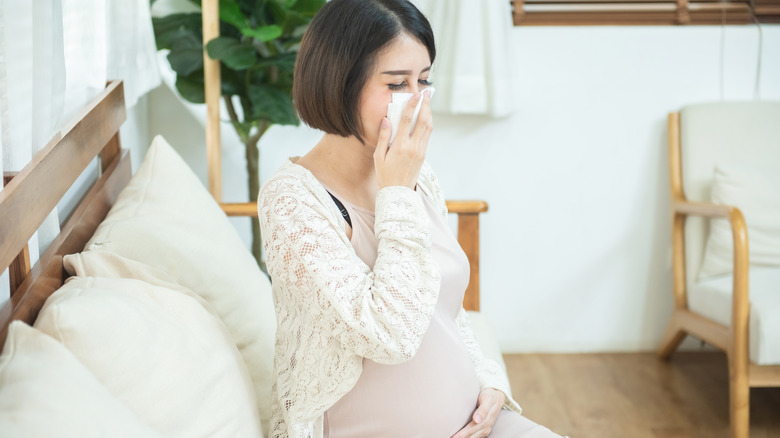The Best Ways To Manage Your Seasonal Allergies While Pregnant
The sneezing, sinus congestion, runny nose, and itchy eyes that come along with seasonal allergies aren't pleasant for anyone. For some people, however, there are a number of things that may take their allergy symptoms to new heights. This can range from using the wrong kind of air filter in your home, letting clothes dry outdoors, not using hot-enough water in your washing machine, or even walking into a friend's house filled with houseplants.
But environmental triggers may not be the only influencing factor when it comes to worsening allergies. Rather, one-third of expecting women claim that their seasonal allergies tend to kick it up a notch throughout pregnancy, according to experts at the Allergy & Asthma Network. While this leaves two-thirds of women reporting either no changes to their allergies or even improvement in their allergy symptoms, those who are negatively affected will likely have questions about the safest and most effective ways to manage their allergies while pregnant.
Seasonal allergies or pregnancy rhinitis?
Most often, worsening allergies during pregnancy are more likely to occur in women with pre-existing seasonal allergies. However, it is not impossible for first-time allergies to emerge during pregnancy either, notes the Allergy & Asthma Network.
That said, certain allergy-like symptoms experienced during pregnancy — such as nasal congestion — may not be related to allergies at all. Sometimes referred to as pregnancy rhinitis, the condition occurs as a result of hormonal changes that prompt the swelling of mucous membranes as a patient enters their second trimester. What sets allergies apart from pregnancy rhinitis, however, is that allergies will be accompanied by sneezing and itching, while pregnancy rhinitis will not.
Once you've ruled out pregnancy rhinitis, talk to your physician about what kinds of allergy-relief treatment methods would be best based on your specific health needs. Generally speaking, however, there are some daily tactics one can implement to help keep allergy symptoms at bay during pregnancy.
Daily tips and recommended medications
The best way to manage seasonal allergies while pregnant is to try and avoid allergens as much as possible, as this method carries the least risk. If you find your allergies are triggered by pollen and other outdoor allergens, minimize the chances of exposure by keeping doors and windows closed. For indoor allergens such as dust mites or pet dander, try having your pet sleep in an alternate bedroom, and use protective encasings to keep your mattress and pillows free of contaminants.
When it comes to medication treatment options, your doctor may suggest oral antihistamines or saline nasal sprays for more mild cases of seasonal allergies (via UT Southwestern Medical Center). The majority of research regarding the safety profile of these drugs has been on first-generation oral antihistamines such as Dimetapp, Chlor-Trimeton, and Benadryl (via HealthDay). Therefore, these may be among your physician's top recommendations, as no danger to the fetus has been identified in relation to these medications. Conversely, Sudafed is not advised for use during the first trimester of pregnancy, as it can pose minor risk of abdominal wall birth defects.
While it's best to avoid starting any new allergy medications during pregnancy, those who were already receiving immunotherapy treatments should continue taking these medications as prescribed. While there is a slight risk of pregnancy complications with these treatments, the risk may be higher if a patient discontinues use and develops an ear or sinus infection that requires antibiotic or oral steroid treatments, per UT Southwestern Medical Center.



